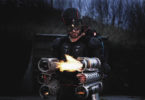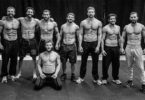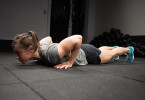You know who reads a shit-ton of books? Warren Buffet. In one interview, he estimated that he spends over 80 percent of his time just sitting in his office, reading and thinking. In another, his business partner Charlie Munger put it this way:
Neither Warren nor I is smart enough to make the decisions with no time to think. We make actual decisions very rapidly, but that’s because we’ve spent so much time preparing ourselves by quietly sitting and reading and thinking.
I read quite a lot, but probably not as much as Warren Buffet – after all, I have a full-time job (which, unlike Warren’s, doesn’t afford me the luxury of just chilling with a book whenever I like) and a weightlifting and fighting habit to sustain. I do read a lot, though. At a rough estimate (based on scribbling it down on a bit of paper), I read about 32 books in 2013, alongside probably double that word-volume in weightlifting articles, fight analysis and New Yorker pieces about elevators. This isn’t just because I like reading – it’s because reading lets me see the connections between disparate fields of human endeavour, which is really what Live Hard is all about. With very few exceptions, most of my big insights about life have come when I’ve been wedged into the side-seat of a train, slumped on the sofa, or stood up on a bus, reading some book or other.
Anyway. Here’s how I get through a lot of books, and how I think you can probably do the same.
Forget speed reading
Yes, it works, sort of. Tim Ferriss and new app Sprtiz both offer solutions based on your ‘saccade’ – the time-consuming movement of your eyes from side to side. Both methods will allow you to read faster. But, as this excellent (and long) Atlantic piece points out, most studies suggest that increasing speed decreases comprehension and retention. More importantly, who wants to speed through something really good? I prefer to read books by whizzing through, then lingering on passages that I like – more on that in a sec. The important thing to take away from the studies is that your language skill and vocabulary is really what puts an upper-limit on reading – I, for instance, am more likely to be able to crank through a piece about deadlift technique and understand it than a world champion speed reader. The takeaway? Reading more makes you better at reading.
Recognise that you already read a lot
According to at least one source, you already read around 54,000 words a day, most of it probably social media posts or newspaper articles about the Oscars or Buzzfeed posts about badgers that look like Jennifer Love-Hewitt. That’s longer than Slaughterhouse 5 or Animal Farm. Unfortunately, what you read is probably mostly crap. This is fixable.
Have a system for tagging things
You might want to use Pocket, or a similar read-it-later app – I’ve tried a few, they don’t work for me. What I do is a relatively low-tech combination of favouriting non-essential reads on Twitter or bookmarking them online, and adding things that I absolutely want to read to a Google doc that I maintain just for that purpose. Whenever I get ten spare minutes, I’ve got a hierarchy of interesting stuff ready to go. Crucially, I don’t have to log in to an entirely new ‘thing’ to get to my reads – I’m always on Twitter or Google anyway, so these things are at the forefront of my mind.
Be utterly ruthless
Firstly: loads of things are crap. When you recognise that something you read is rubbish, either because of obvious logical fallacies or the Gell-Mann effect (perfectly described here by Michael Crichton), just stop reading it: fuck sunk-cost theory. Secondly: an enormous amount of the pop-science books I read (and would recommend) include huge amounts of extraneous information. This is usually because they’ve got an excellent central point to make, but not one where the actual research will fill a 60,000 word book. Malcolm Gladwell is insanely guilty of this, and it’s really obvious once you start looking – for every hard bit of data, there’s an extended description of what sort of jacket someone wears or what their office looks like. This is where you can legitimately skim pages.
Get a Kindle
Or your preferred brand of e-Reader. I’m sorry – I love going in bookshops, and I love the smell of books and all that, but being able to highlight things has had an amazing effect on the amount of words I can consume. Firstly, a semi-rigorous highlight-then-revise programme (ie, looking at your Kindle Highlights every couple of weeks) will reinforce concepts (or just remind you of brilliant phrasing) that you want to remember. Good practice is to do the opposite of what most students do when highlighting: try to keep it to two sentences or less. Not only does this make your highlights easier to skim, it forces you to bore down to the core of an argument, making it more likely that you’ll remember it.
MAKE TIME TO READ
This is the big one, really. We live in a world where you can be distracted at every moment of every day, if you really want to. There’s always more to look at on Reddit or Twitter, and your Candy Crush score will never be high enough. By comparison, reading doesn’t offer the same insta-thrills. But it offers a lot more than that in the long run. So delete every time-wasting app off your phone (see my White Room post for more on this), make sure you go out at lunchtime – even if it’s just for five minutes – and read something. It’ll make you more like Warren Buffett.
HOMEWORK: Read an entire book this week. If you haven’t read Slaughterhouse 5 or the Old Man And The Sea, there’s an easy decision for you. If not, look at the previous three entries in Read Hard: here, here and here. Post your pick in the comments. In the meantime, I’ll leave you with this beauty:
‘I used to love to call L.A. when I lived in New York: “What are y’all doin’? Talking to TV producers, huh? Bummer. Me? I’m reading a book! Yeah, we’re thinkin’ back East. Yeah, we’re evolving.’ – Bill Hicks, Arizona Bay






My brother Dave once said Tom Clancy can squeeze a 200 page book into 600 pages.
As for Malcolm Gladwell, what works best for me is for Debbe to read his books and then tell me all about it on a long walk.
Ha! Jess once told me she doesn’t need to read any cycling books because I just recite the best bits as I read them.
Great post! You may have convinced me to get a kindle for non-fiction. Completely agree that good fiction should be lingered over though.
I guess all e-readers are largely the same – but one thing that I forgot is that the ‘dictionary’ function (for instantly looking up words) has massively helped my vocab. Also I sometimes find turns of phrase in literature that I just *have* to highlight. Long story short: I use the Kindle for everything now.
I bought a kindle last August and my overall reading has exploded! I set myself a target of reading 3 books a month (mostly non fiction). Now I have discovered that highlighting feature the game is about to change! Love the idea of being able to review them every couple of weeks.
Cheers!
I’m a reading specialist and I agree completely! Critical reading is necessary, a little mindless fun is great, but really good stuff is, well, really good stuff for your brain and vocabulary. Speed reading only means you call words fast.
I have a problem, “Dr.” Joel. I have six books going at once using three different platforms. Four-the usual paper, one-kindle, and one-audio. Now that I have a smart phone, I can read my kindle book on the app, when necessary, anywhere. Or, I could listen to my audio book. I get through them slowly, but I need all sorts of information and always need some entertainment. What is your diagnosis? Be gentle, but tell the truth. 🙂
Hey Debbe! One recommendation I like is to stick to fiction before bed: non-fiction, especially self-improvement stuff, is likely to get your mind racing and affect your quality of sleep.
To be honest, six books is a lot, and *might* be starting to affect your ability to enjoy/remember critical chunks of them. Then again, it might not. I can usually get away with about four: a fairly brainless novel, a hard-going novel, an easy pop science one and a hard technical one. That way I’ve usually got something that suits my mood. Audiobooks I only bother with when I’m walking around and so can’t read. Hope that helps!
Totally agree with this.
One of the hardest things is to change habits. Personally my biggest failure point when sitting down to read is the first 10 minutes. I get restless and think about all the other shit I could be doing. If I fight through that i’ve made it and my mind has silenced or at least muffled. It’s all about getting into a state of mind and settling into the book.
A bit of gamification by making it a challenge to read for 30 minutes each day for 30 days is also a good methodology. It’s all about showing up. The rest will take care of itself.
Instapaper app for iPhone has massively increased the quality and quantity of the on-line stuff I read.